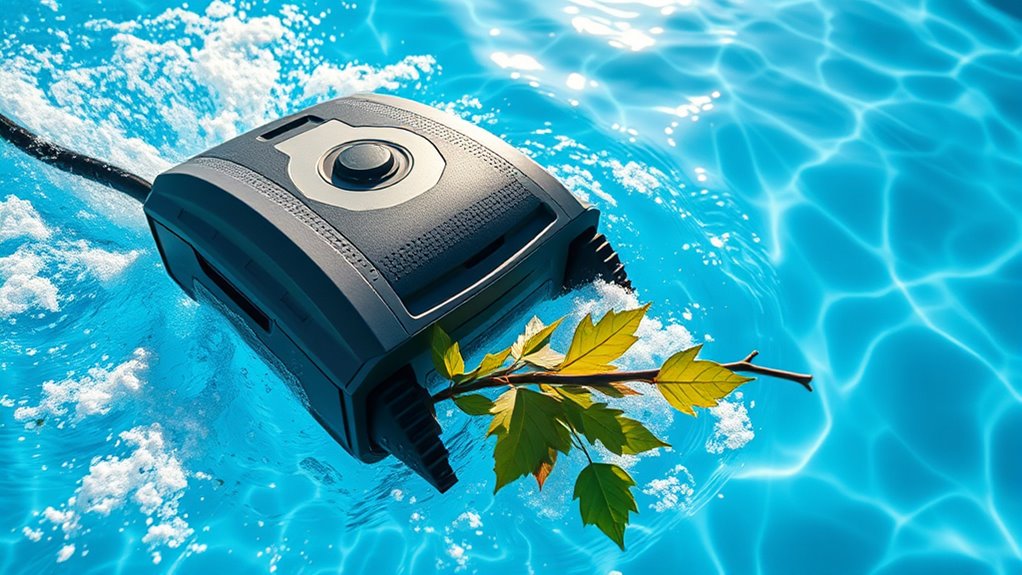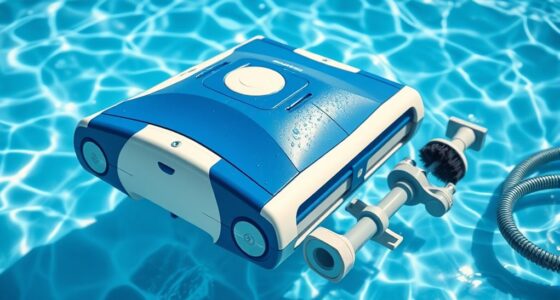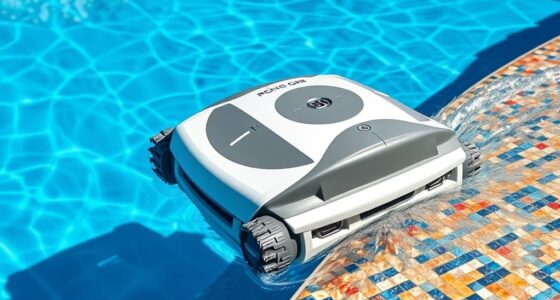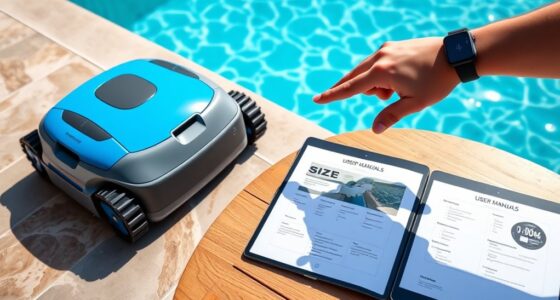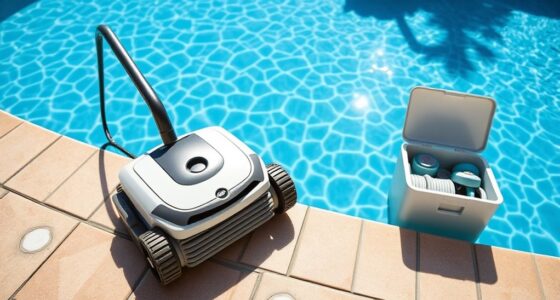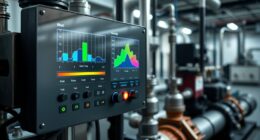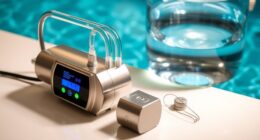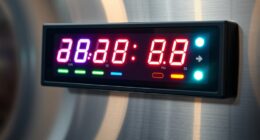Pressure pool cleaners are great for tackling large debris like leaves and twigs. They use powerful water jets and suction to easily pick up heavy debris without clogging. Look for models with strong suction, large debris chambers, and durable build quality. Proper maintenance and understanding of water chemistry help them work efficiently. For more tips on choosing the best pressure cleaner for your needs, keep exploring these options.
Key Takeaways
- Choose pressure pool cleaners with powerful suction and large intake valves for effective large debris removal.
- Ensure the model has high debris capacity and reinforced chambers to handle leaves, sticks, and heavy dirt.
- Opt for units compatible with your pool size and equipped with adjustable pressure settings for customization.
- Regular maintenance of filters, skimmers, and hoses is essential for optimal large debris cleaning performance.
- Select durable, heavy-duty models designed specifically for frequent large debris handling and long-term use.
How Pressure Pool Cleaners Handle Large Debris Effectively
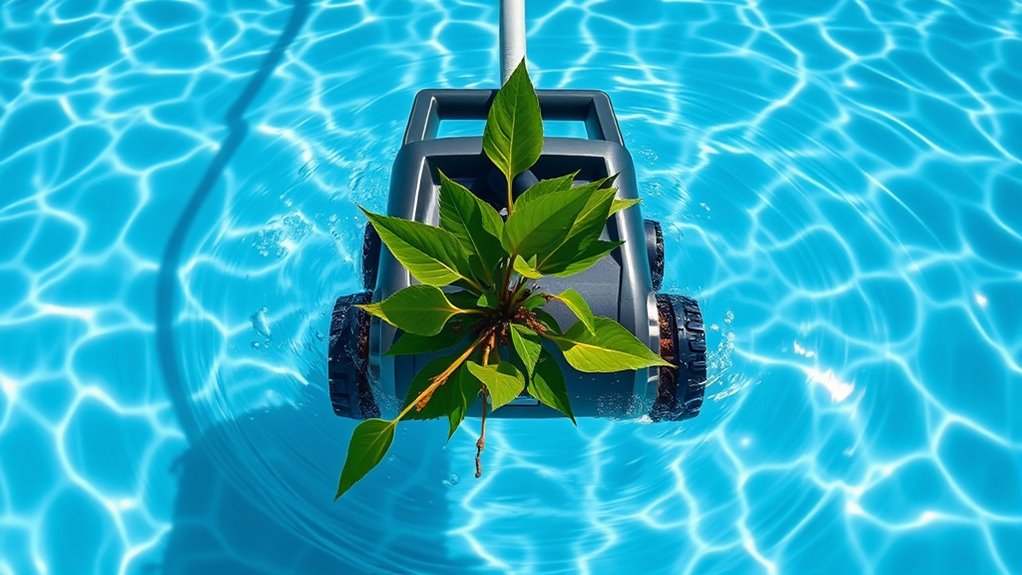
Pressure pool cleaners are designed to tackle large debris efficiently by using powerful jets of water to dislodge and vacuum debris from the pool floor and walls. They excel at removing leaves, twigs, and other sizable objects that might clog or slow down traditional cleaners. Proper chemical balance plays a crucial role in maintaining pool safety and ensuring the cleaner functions effectively; imbalanced water can cause debris to stick or settle unevenly. By consistently monitoring pH levels and sanitizer levels, you help prevent algae growth and buildup that could hinder cleaning performance. When debris is managed well and the water chemistry is balanced, pressure pool cleaners work more efficiently, keeping your pool safe, clean, and ready for swimming without risking equipment damage or health issues.
Key Features to Consider When Choosing a Pressure Pool Cleaner
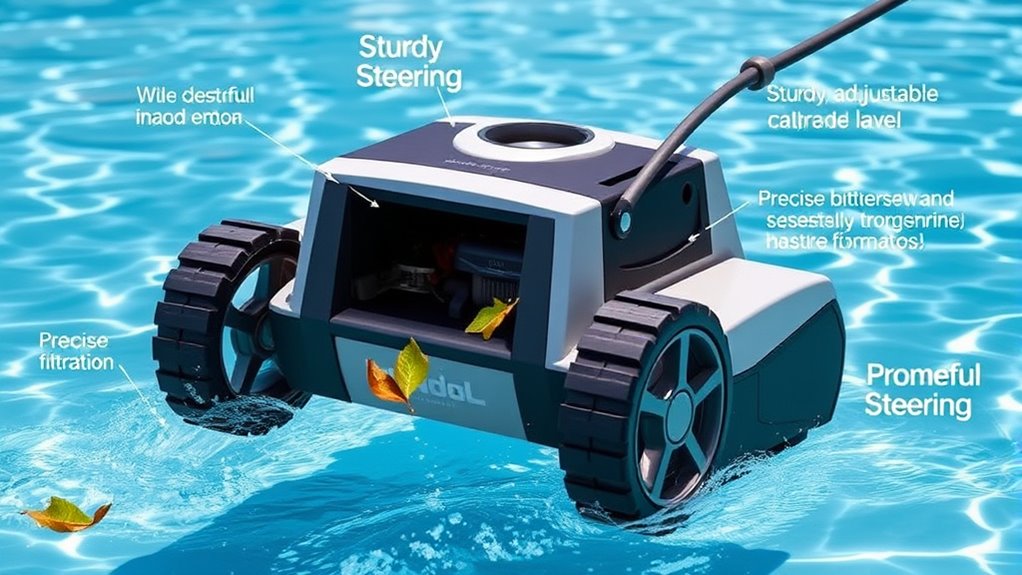
When selecting a pressure pool cleaner, it’s vital to focus on key features that guarantee effective and efficient cleaning. Water filtration is essential because it prevents debris from recirculating into your pool, maintaining water quality. Look for models with advanced filtration systems that trap large debris and fine particles. Debris storage capacity also matters—choose a cleaner with ample storage to reduce frequent emptying, especially if your pool has lots of large debris. A larger debris container minimizes interruptions and improves cleaning efficiency. Additionally, consider the ease of access to the debris chamber and how well it seals to prevent leaks. These features ensure your pressure cleaner performs reliably, keeps your pool pristine, and reduces maintenance time. High contrast ratios can also enhance the visibility of debris, making cleaning more thorough. Regularly inspecting and maintaining these features can further prolong the cleaner’s lifespan and performance for optimal results, especially when using specialized filters designed for different debris types. Moreover, understanding the tuning capabilities of your cleaner can help optimize its performance based on your pool’s specific needs. A comprehensive understanding of filter types can also aid in selecting the most suitable filtration system for your pool conditions.
Top Models of Pressure Pool Cleaners for Heavy Debris Collection
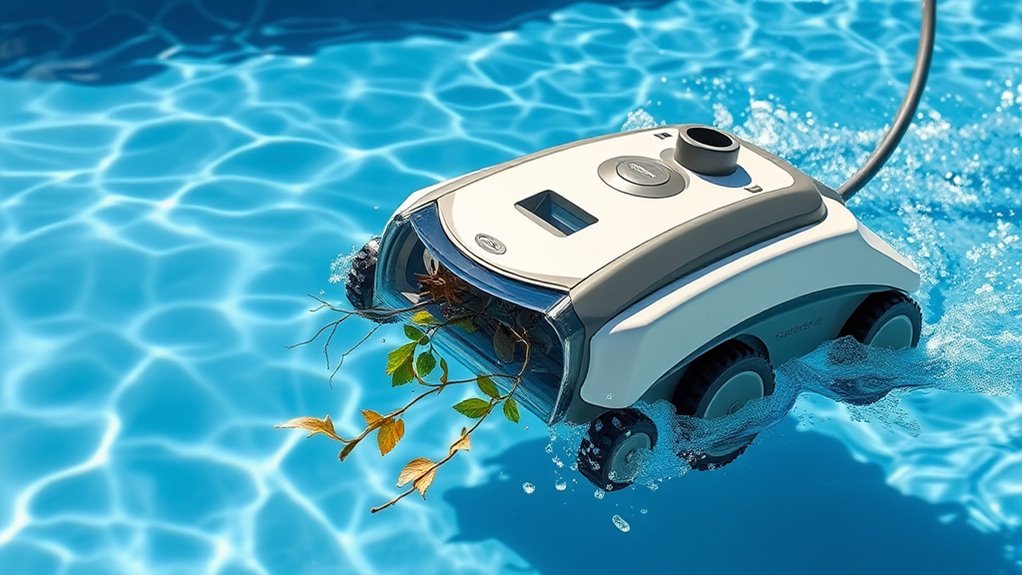
When dealing with heavy debris, you need pressure pool cleaners with powerful suction that can handle large leaves and dirt efficiently. Look for models designed for heavy-duty debris handling to keep your pool spotless without constant maintenance. These top models also offer extensive cleaning coverage, saving you time and effort.
Powerful Suction Capabilities
Top models of pressure pool cleaners excel at heavy debris collection thanks to their powerful suction capabilities. This strength guarantees you can pick up leaves, sticks, and other sizable debris quickly and efficiently. To maximize suction, it’s vital to maintain proper pool chemistry, as balanced pH and chlorine levels prevent debris from sticking or floating unevenly. Additionally, the skimmer design plays an essential role; a well-constructed skimmer directs debris smoothly into the cleaner’s suction pathway, enhancing performance. Proper digital literacy programs can also help users understand and optimize their pool cleaning equipment, ensuring peak operation. Regularly checking and cleaning the filter system helps sustain optimal suction power and prolongs the lifespan of your cleaner. These features work together to guarantee your cleaner operates at peak efficiency, reducing manual cleanup efforts. With powerful suction, you’ll enjoy a cleaner pool, less maintenance, and more time swimming rather than skimming. Ensuring regular maintenance of your equipment further supports equipment longevity and optimal performance. Additionally, understanding cybersecurity risks associated with pool automation systems can help protect your smart pool devices from potential threats.
Heavy-Duty Debris Handling
For tackling heavy debris like large leaves, sticks, and acorns, top pressure pool cleaners are built with heavy-duty components that deliver exceptional performance. Their reinforced brushes and powerful jets guarantee they can pick up bulky debris without clogging, saving you maintenance time. These cleaners are effective even when pool algae start to form or when chemical balancing is off, as their strong suction and scrubbing action help remove stubborn buildup. By efficiently handling large debris, they reduce strain on your pool’s filtration system and improve water clarity. Proper operation of these cleaners also supports maintaining balanced chemicals, preventing algae growth and ensuring a healthy swimming environment. Regular tuning and maintenance of your pressure pool cleaner can extend the lifespan of your equipment and enhance overall pool hygiene. Additionally, selecting a model with heavy-duty components ensures durability and consistent performance over time. For optimal results, choosing a cleaner with advanced debris handling features can further improve efficiency and ease of use.
Efficient Cleaning Coverage
Achieving thorough cleaning coverage with pressure pool cleaners requires models that effectively navigate and target all areas of your pool. Top models are designed to optimize water circulation, ensuring debris is moved efficiently to the skimmer or filter. Proper water circulation helps maintain a balanced chemical level, preventing algae buildup and cloudy water. These cleaners use precise navigation patterns to cover every inch, including hard-to-reach corners and steps. When water flows correctly and the chemical balance is maintained, debris collection becomes more effective. Look for models with adjustable jets or steering features to enhance coverage. Consistent circulation and chemical balance work together, allowing your pressure cleaner to do its job thoroughly, leaving your pool spotless and ready for use. Additionally, selecting a Preppy Dog Name that reflects your style can add a touch of personality to your pool area. Regular maintenance of filters and cleaning routines further ensures optimal performance, and ensuring proper water flow is essential for maximizing debris pickup efficiency. Incorporating advanced navigation technology can further improve cleaning efficiency and coverage.
Installation and Maintenance Tips for Pressure Pool Cleaners
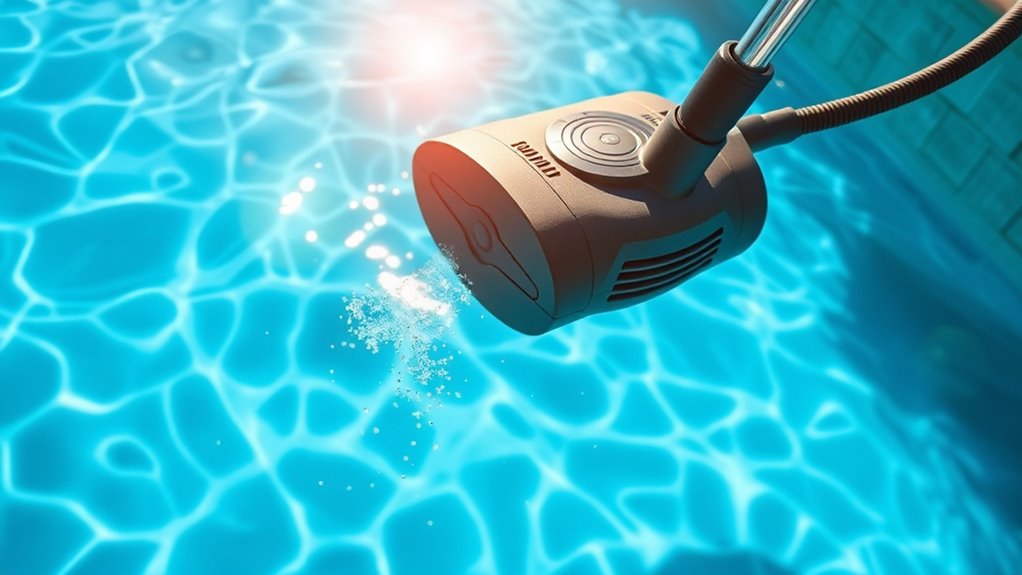
Getting your pressure pool cleaner set up correctly is essential for peak performance. Regular maintenance keeps it running smoothly, and knowing how to troubleshoot common issues saves you time and frustration. Let’s explore the best installation techniques, maintenance practices, and tips for solving problems quickly. Properly assessing your cleaner’s energy efficiency can also help reduce long-term operational costs and ensure effective cleaning performance. Understanding the reservoir system in self-watering planters can give insights into how water is delivered consistently, which can be useful when maintaining your pool cleaner’s water supply system.
Proper Installation Techniques
Proper installation of a pressure pool cleaner is essential to guarantee it operates efficiently and lasts longer. Start by ensuring your pool water chemistry is balanced, as improper pH or chlorine levels can affect cleaner performance. Follow the manufacturer’s instructions carefully when connecting hoses and attaching the cleaner to your pool’s skimmer or dedicated pressure line. Make sure all fittings are secure to prevent leaks and loss of pressure. During installation, keep pool safety tips in mind—turn off the pump before connecting the cleaner to avoid accidents. Verify that the cleaner moves freely around the pool without obstructions. Proper setup ensures ideal debris pickup and prevents damage, helping your cleaner work effectively while extending its lifespan.
Routine Maintenance Practices
Regular maintenance keeps your pressure pool cleaner performing at its best and extends its lifespan. To do this, regularly check and balance your pool chemicals, especially pH and chlorine levels, to prevent algae buildup that can clog the cleaner. Keep the skimmer basket and filters clean, removing debris that could hinder performance. Inspect hoses and connections for leaks or wear, replacing parts as needed. Proper pool chemical balancing helps maintain water clarity and reduces algae, which can impair the cleaner’s effectiveness. Additionally, rinse the cleaner after use to remove dirt and debris. By staying on top of these routine practices, you ensure your pressure pool cleaner runs smoothly, efficiently handles large debris, and avoids unnecessary repairs or replacements.
Troubleshooting Common Issues
When your pressure pool cleaner isn’t working as expected, troubleshooting can quickly identify and resolve common issues. First, check the pool safety to ensure the cleaner isn’t obstructed by debris or tangled hoses. Verify the water pressure; if it’s too low, the cleaner won’t operate properly. Inspect the hose connections for leaks or blockages and clean or replace as needed. Also, confirm the chemical balance of your pool; improper chemical levels can affect circulation and cleaning efficiency. Regularly maintaining proper chemical balance helps prevent algae buildup and keeps equipment functioning smoothly. If the cleaner still struggles, examine the skimmer and pump baskets for clogs. Addressing these issues promptly keeps your pressure pool cleaner running efficiently and maintains a safe, well-maintained pool environment.
Comparing Pressure Cleaners With Other Pool Cleaning Options
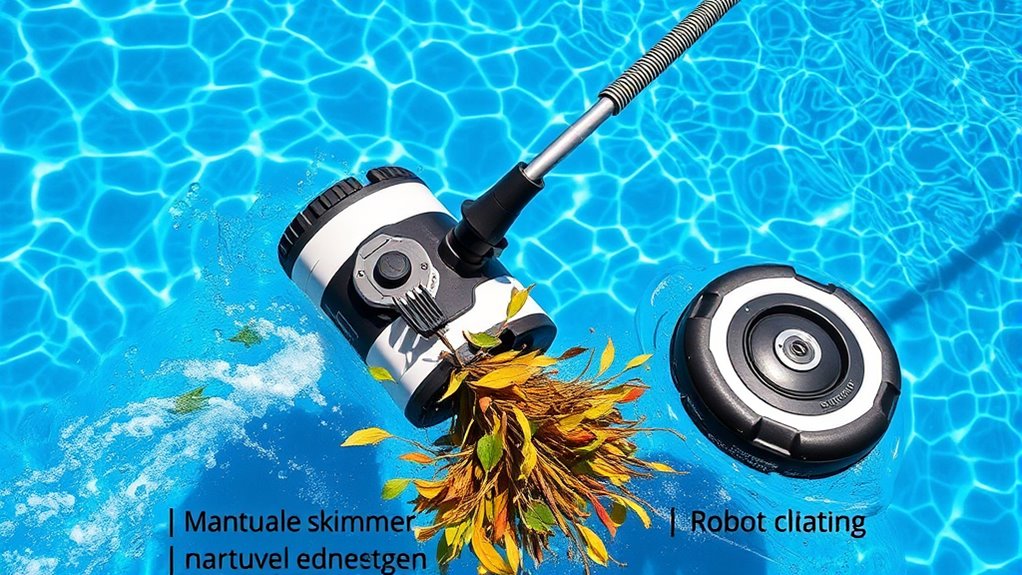
Pressure pool cleaners stand out for their efficiency and ease of use, but they’re just one option among several. Depending on your needs, you might consider robotic cleaners or manual skimming. Robotic cleaners work independently, requiring no pool pressure connection, and often handle delicate pool surfaces better. Manual cleaning allows you to control pool chemical balance and ensures safety precautions are followed during maintenance. Here’s a comparison:
| Feature | Pressure Cleaners | Robotic Cleaners | Manual Cleaning |
|---|---|---|---|
| Ease of Use | Easy, automated | Very easy, autonomous | Requires effort |
| Debris Handling | Large debris, heavy debris | Small debris, fine dirt | Varies, depends on effort |
| Maintenance | Moderate | Low | High |
Choose based on debris size, convenience, and your ability to maintain pool safety.
Troubleshooting Common Issues With Pressure Pool Cleaners
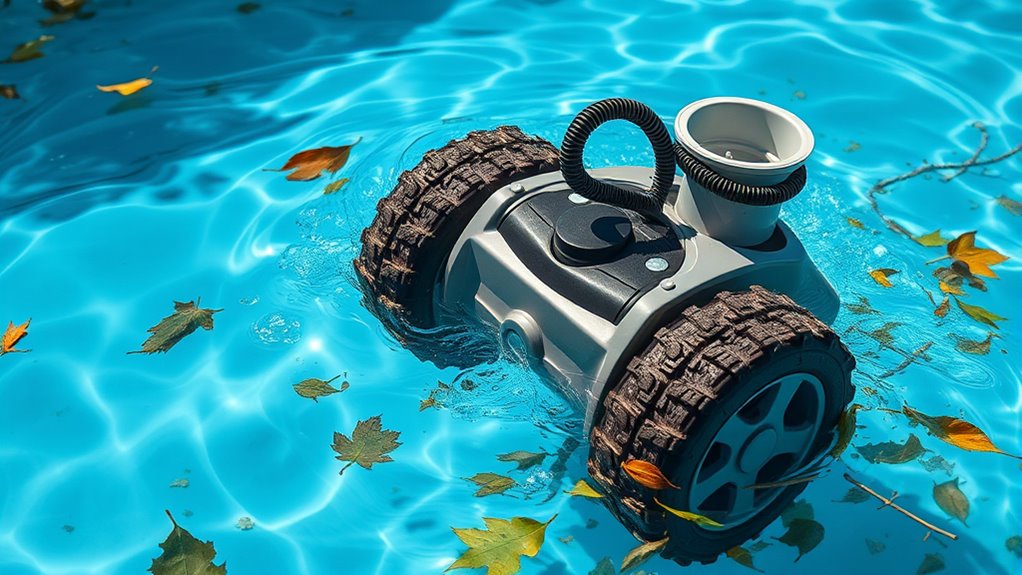
Despite their efficiency, pressure pool cleaners can sometimes encounter common issues that disrupt their performance. First, a clogged hose or nozzle can reduce water flow, hindering debris removal. Second, improper water chemistry can cause algae buildup or cloudy water, affecting cleaning efficiency and pool safety. Third, incorrect placement or a tangled hose may prevent the cleaner from covering the entire pool surface. To troubleshoot, check the hose for blockages, ensure your water chemistry is balanced, and verify the cleaner’s placement. Regularly inspecting these elements keeps your pressure cleaner working effectively. Addressing these issues not only improves cleaning performance but also promotes overall pool safety and ideal water conditions. Keeping everything in check ensures your pool remains clean and safe for swimming.
Benefits of Using a Pressure Pool Cleaner for Large Debris
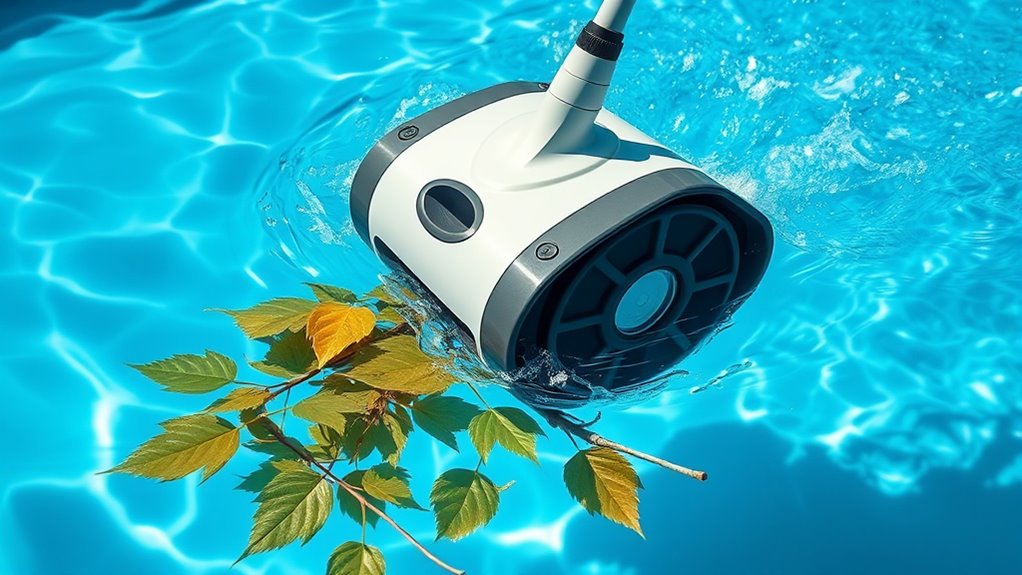
Using a pressure pool cleaner to handle large debris offers significant advantages. It efficiently removes leaves, twigs, and other sizable objects, saving you time and effort. This cleaner promotes better water circulation by preventing debris buildup that can hinder flow and circulation. Keeping the pool free of large debris also helps maintain proper pool chemistry, reducing the risk of algae growth and chemical imbalance. Here’s a quick overview:
| Benefit | Impact | Why It Matters |
|---|---|---|
| Efficient debris removal | Faster cleaning process | Keeps water clear and healthy |
| Enhances water circulation | Uniform water flow | Prevents stagnation |
| Supports pool chemistry | Stable chemical balance | Keeps water safe and balanced |
A pressure cleaner makes large debris removal straightforward, improving overall pool health and clarity.
Cost Analysis: Investing in the Right Pressure Pool Cleaner
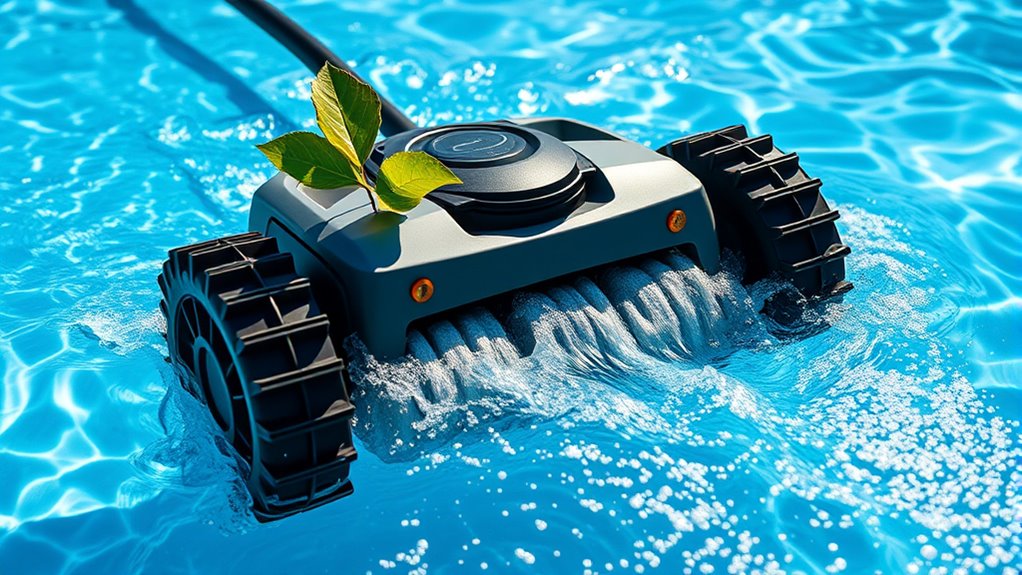
Investing in the right pressure pool cleaner requires careful consideration of both upfront costs and long-term expenses. A thorough cost comparison helps you find the best value. First, consider the initial purchase price, which can range from budget to premium models. Second, evaluate maintenance costs over time, including parts and repairs. Third, factor in energy efficiency, as some models consume less power, saving you money monthly. Brand reputation plays a vital role; trusted brands often offer better durability and support, reducing long-term costs. While cheaper options might seem appealing initially, they may require more frequent repairs or replacements. Ultimately, balancing upfront costs with potential long-term savings ensures you select a cleaner that fits your budget and meets your large debris cleaning needs effectively.
Tips for Maximizing the Efficiency and Longevity of Your Cleaner
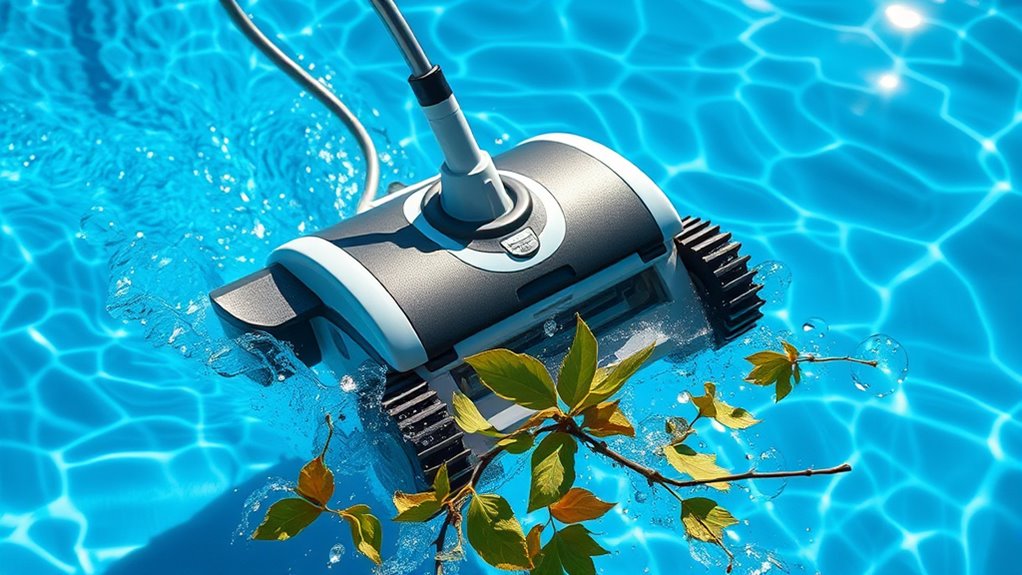
To get the most out of your pressure pool cleaner, regular maintenance and proper operation are essential. Keep the pool’s chemical balance in check to prevent buildup that can hinder cleaning performance. Ensure the water chemistry is balanced to promote pool safety and ideal cleaner function. Clean or replace filters regularly to avoid clogs and maintain suction power. Use the table below to help you stay on top of routine tasks:
| Maintenance Task | Frequency |
|---|---|
| Check and adjust chemicals | Weekly |
| Clean or replace filters | Monthly |
| Inspect hoses and fittings | Biweekly |
Frequently Asked Questions
Can Pressure Pool Cleaners Handle Floating Debris?
Floating debris can be tricky to remove from your pool, but pressure pool cleaners are effective if they include surface skimming features. These cleaners use water pressure to lift and remove floating debris like leaves and insects, keeping your pool clean and clear. Make sure to choose a model designed for surface skimming, so it can handle floating debris efficiently, saving you time and effort in pool maintenance.
How Long Does Installation Typically Take?
Ever wondered how long it takes to get something up and running? The installation timeline for a pressure pool cleaner generally depends on your setup process, but most installations are quick—often completed within a few hours. You’ll need to connect hoses and make certain of proper placement. Are you prepared to streamline the setup process? With the right tools and instructions, you can enjoy hassle-free installation and get back to swimming sooner.
Are Pressure Pool Cleaners Suitable for All Pool Types?
You might wonder if pressure pool cleaners work on all pool surfaces and water chemistry. They are generally suitable for concrete, vinyl, and fiberglass pools, but your pool’s surface can affect cleaning efficiency. Keep in mind that water chemistry impacts the cleaner’s performance and longevity. Regularly check and adjust your water chemistry to guarantee peak operation. With proper maintenance, pressure pool cleaners can effectively handle various pool types.
Do Pressure Cleaners Require Special Hoses or Fittings?
When considering pressure cleaners, you might wonder if they need special hoses or fittings. Generally, they do require hose compatibility and fitting requirements to work properly. You should check that your existing hoses are compatible or if you need adapters. Ensuring a secure fit prevents leaks and maximizes cleaning efficiency. Always verify the specifications of your pressure cleaner to match it with the right hoses and fittings for smooth operation.
How Often Should I Service My Pressure Pool Cleaner?
Think of your pressure pool cleaner like a trusted vehicle—it needs regular check-ups to run smoothly. You should service it every 3 to 6 months, depending on usage. Follow maintenance schedules, clean filters, and inspect hoses regularly. Troubleshooting tips include checking for clogs or leaks promptly. Keeping up with these simple steps will guarantee your cleaner stays effective, saving you time and money while keeping your pool pristine.
Conclusion
Investing in a pressure pool cleaner designed for large debris can save you time and effort, proving that proper equipment truly makes a difference. While some believe manual cleaning is enough, studies suggest automated cleaners reduce algae and debris buildup more effectively. By choosing the right model and maintaining it well, you’ll enjoy a cleaner, clearer pool with less hassle—confirming that technology, when used correctly, truly enhances your pool maintenance routine.
